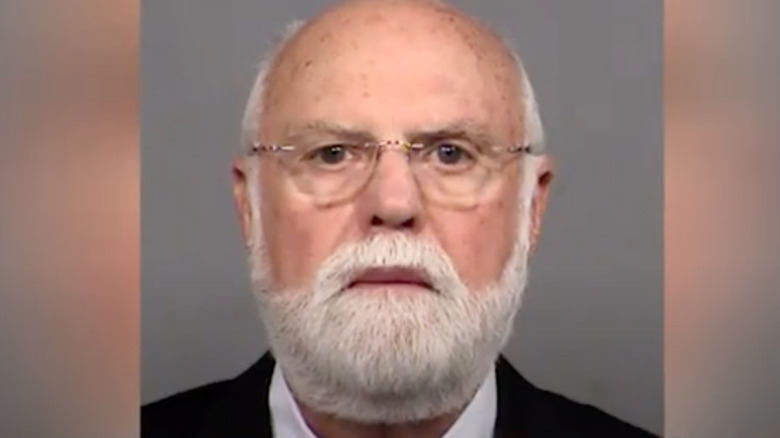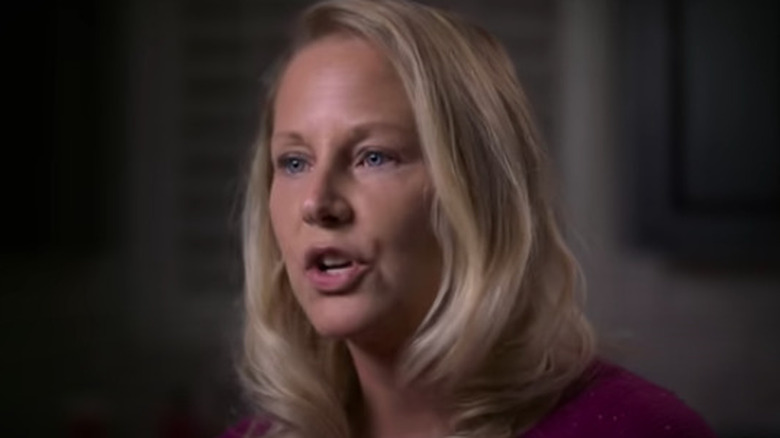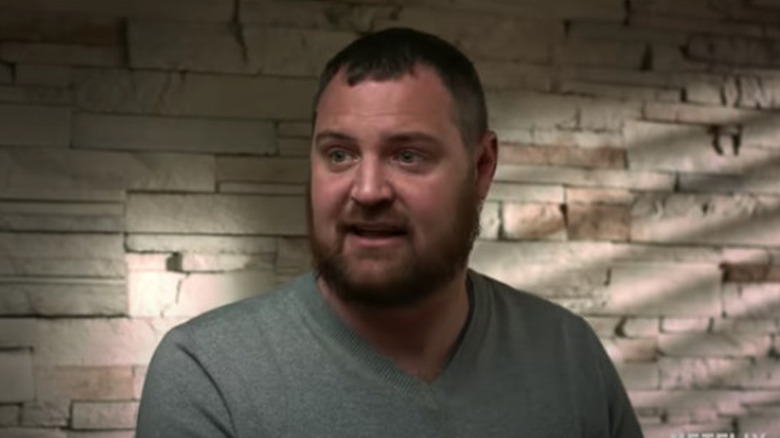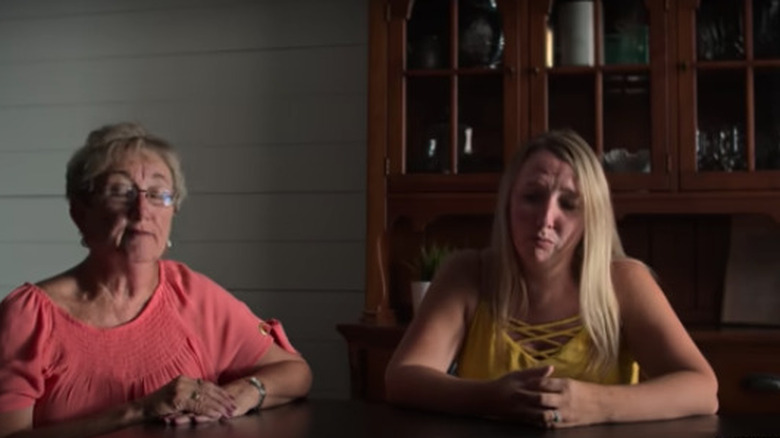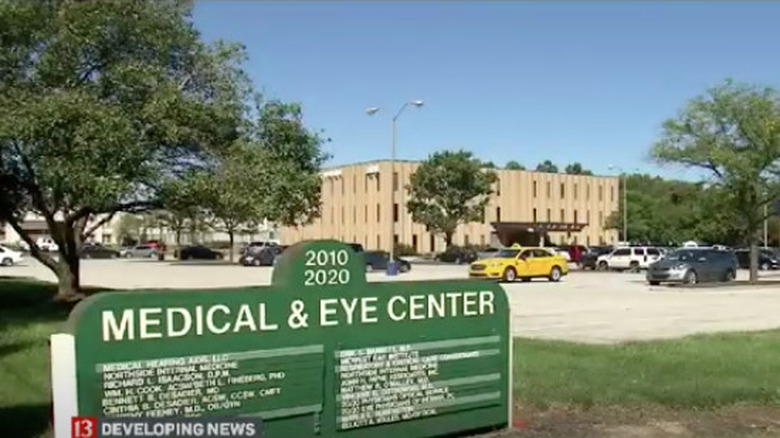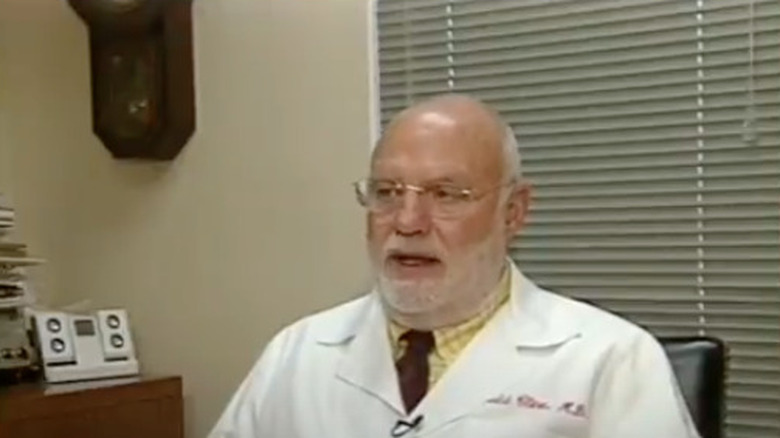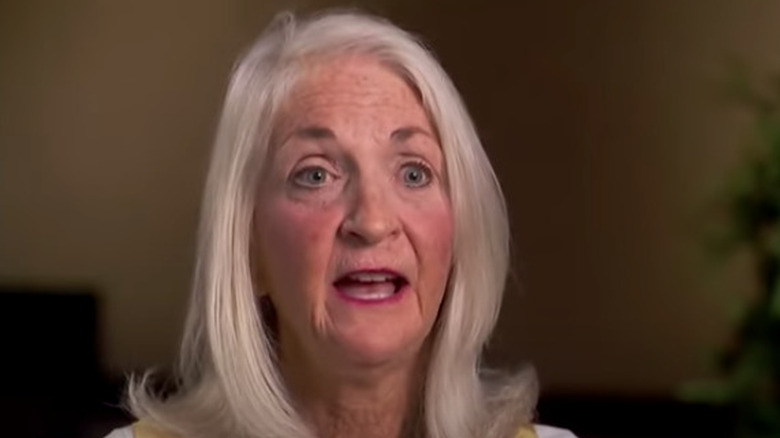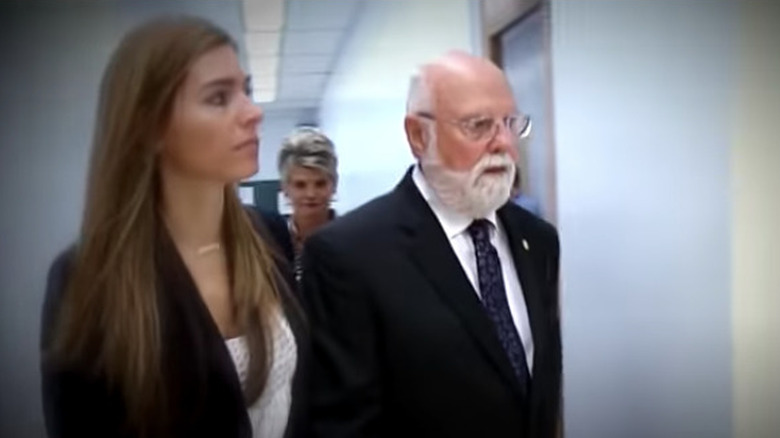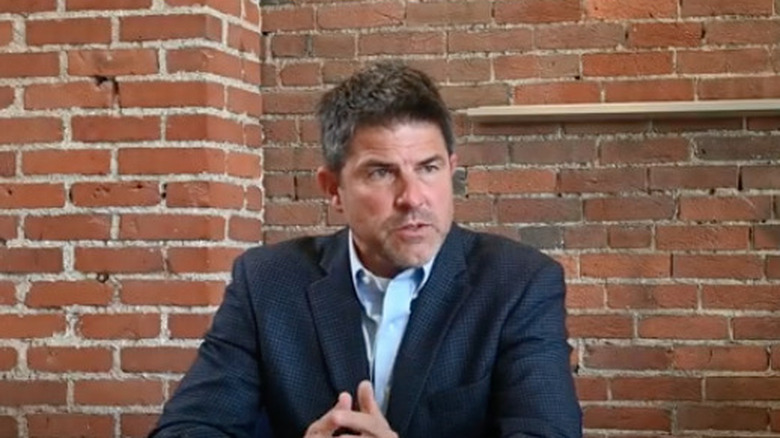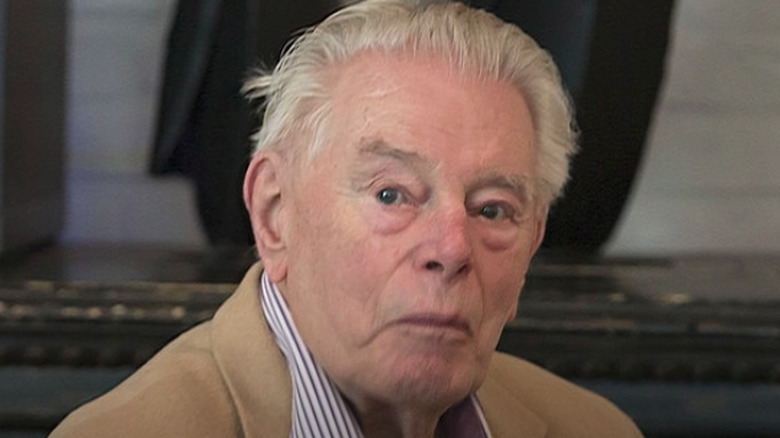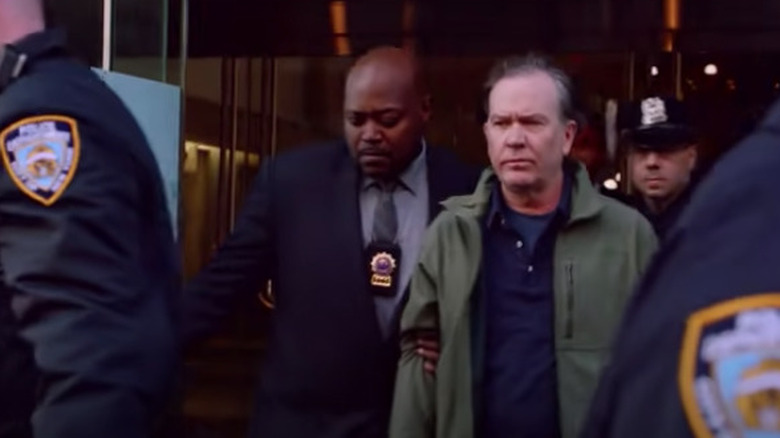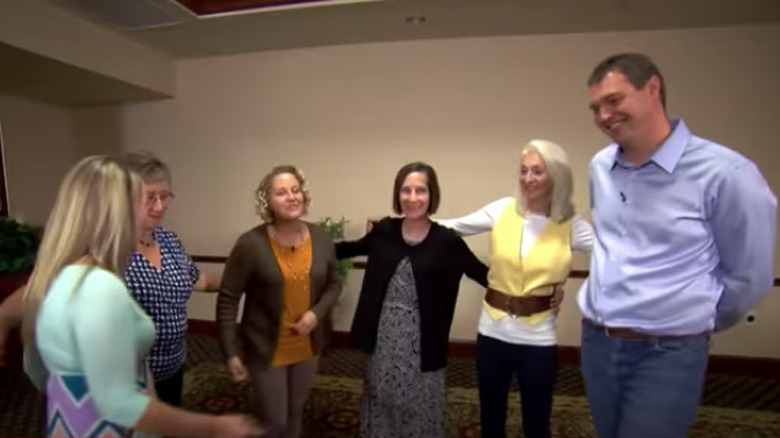The Chilling True Story Behind Netflix's Our Father
It's difficult to imagine now what Dr. Donald Cline once meant to countless families in Indianapolis, Indiana. Infertility has long been a sensitive topic and a source of distress for couples who want to raise children. Cline became a miracle worker in his chosen field. He was the preeminent fertility physician in Indiana and was the doctor women and couples came to when they were desperate. Colleague and fellow doctor William E. Chapman labeled Cline as a "doctor's doctor," per Indianapolis Monthly. He was a keynote speaker at the International Symposium for Infertility in Bologna, Italy, and when he retired, his farewell party had visitors lining up over the length of a city block.
But another story has since been constructed for Cline, once his covert medical practices in the 1980s came to light in 2016: For close to a decade, Cline had been using his own sperm to inseminate his patients. According to The Atlantic, he's fathered at least 50 children, and the number is presumed to be higher. Cline was able to end his career gracefully and retire in peace, but with the proliferation of online DNA testing and do-it-yourself ancestry mapping, his past is coming back to haunt him and the countless patients who were victims of his dishonesty. His story and the stories of the children conceived by his sperm are told in the Netflix documentary "Our Father." Here is the chilling true story behind it.
It began with a 23andMe test
In 2014, Indianapolis resident Jacoba Ballard wondered if she had any unknown siblings. Her mother, Deborah Pierce, was artificially inseminated by Dr. Donald Cline, and Ballard thought there might be one or two other people conceived from the same donor, according to The Atlantic and ABC30 News. She found her first sibling on an online forum for donor-conceived children, where she connected with a woman whose mother was also treated by Donald Cline. They took 23andMe tests and found they had several more half-siblings, eight of them in total. What confounded them was that they were all born between the years 1979 to 1986—a span of seven years; it couldn't have been a random donor.
The DNA tests weren't enough to confirm their biological father's identity. Instead, they researched their DNA matches online and scoured through social media accounts in order to find a common thread and hopefully, discover their master donor. It was then they realized that either Donald Cline or a relative of his connected them all. With more DNA testing, Ballard found that she was a 99.9% match with Cline, per ABC30 News.
Donald Cline fathered at least 50 children
The numbers slowly grew. New siblings were found through DNA matches on Ancestry.com, and they contacted each over social media. Indianapolis resident Matt White found out he was conceived through Donald Cline's sperm from watching the news. His mother used to point out the fertility facility where she received treatment whenever they drove past it, and he was later able to confirm the address as Cline's old office, per The Atlantic. New Palestine resident Julie Harmon (also known as Julie Manes) suspected something was amiss since her blood type didn't match those of her parents. After seeing that same news report, she contacted Jacoba Ballard and then took a DNA test, which revealed their genetic relation and her own connection to Cline, according to IndyStar.
When the siblings confronted Cline in person, he was at first reluctant to disclose how many times he used his own sperm, at first capping his inseminations at nine or 10, per the Sick Podcast. He then admitted to using his own sperm at least 50 times, per ABC30 News. It's expected that he's fathered more, but it's hard to know exactly how many since DNA testing isn't universal, and Cline's clinical records from that time have since been destroyed. His sperm "donations" only stopped in the 1980s once sperm banks were readily more available and frozen sperm became the norm, per The Atlantic.
He lied about sperm donations
Donald Cline's patients were all told their donors were medical residents, and a donor would only ever contribute to at most three pregnancies, according to The Atlantic. When Jacoba Ballard's newfound half-siblings all ended up within a 7-year age range, they knew something was wrong—medical residencies typically lasted three to four years, per ABC30 News. But Cline doubled down on his lie as late as 2015. While being investigated by the Indiana Attorney General, he denied ever using his own sperm for treatments, per The Indianapolis Star.
Unfortunately, Cline's lies ran much deeper. Julie Harmon's father believed that he was her biological father. He and his wife, Dianna Kiesler, were considering adoption when Cline told them he could mix in the father's sperm with that of an anonymous donor. Up to that point, the couple were seeing Cline but using Harmon's father's sperm only. But they still experienced infertility problems. With Cline's proposal, there was renewed hope. Then, at one point in her treatments, Cline told Kiesler that he was only using her husband's sperm, so she believed Harmon was definitely her husband's biological child. Kiesler went on to recommend Cline to her friends. Harmon was the first in her family to find out the truth, so she was the one who broke the news to her father. It was a painful task, and the news left her father distraught and unable to speak about it for years, according to The Indianapolis Star.
His patients were sworn to secrecy
When Indianapolis resident Liz White went to Donald Cline for fertility treatments, he told her to keep it a secret. He promised that the sperm donor would be anonymous and would match her husband's blood type and physical appearance. White was never meant to tell either her husband or her son.
He wasn't alone in this. Once artificial insemination became a viable option, many doctors instructed mothers to keep the donation a secret from children and even, sometimes, their husbands. This was usually done to avoid legal issues as to who the father was and to avoid embarrassing the husband and child, according to The Atlantic. And in order to maintain secrecy surrounding sperm donations, records were scarcely kept. In 1979, only 37% of doctors kept records on children and 30% kept records on donors, per The Huffington Post.
Cline obviously meant for his practices to be kept secret. While being investigated by the Indiana Attorney General, Cline accused his plaintiffs of libel and slander, per The Indianapolis Star.
Donald Cline was a well-respected doctor
Donald Cline was once the go-to fertility doctor in Indianapolis. When couples didn't find success with frozen sperm treatments at other clinics, they went to Cline. He used fresh sperm and would inseminate within the hour it was obtained to optimize its viability, according to The Atlantic. As a result, he built a reputation of success, and his name became well-respected in his field.
He was among a pioneering group of endocrinologists who froze women's eggs after in vitro fertilization instead of discarding them, circumventing the controversy surrounding in vitro, according to WTHR News. He was also one of the first doctors in Indiana to perform surgery using a laparoscope camera, a revolutionary technique in gynecology that prevents the need for large incisions, according to the Indianapolis Monthly and the NHS.
But Cline was hiding a darker truth about his practice. According to the probable cause affidavit filed against Cline, he would use his sperm for inseminations when he didn't have fresh donor sperm on hand (via the Chicago Tribune). He even went so far as to say that he "felt pressured" to do so. He also kept note of which of his clients received his sperm just in case they wanted another baby so that he could use his own sperm again.
He used his religion as a defense
When Jacoba Ballard and her half-siblings met Donald Cline in person for the first time, he shielded himself with Bible verses and implied that God had permitted his actions, according to the Sick Podcast and The Atlantic. After their restaurant meet-up, he telephoned Ballard and recalled his favorite Bible verse to amplify his point, Jeremiah 1:5: "Before I formed you in your mother's womb, I knew you." It exploited Ballard's Catholic faith, which she and Cline both shared.
Cline found religion while in medical school and later became an elder of the Zionsville Fellowship Church in Zionsville, Indiana. His fellow congregants came to his defense when news broke about his insemination practices, according to the Sick Podcast. He and his wife—with whom he had two children—used to teach a class at their home called "Growing Kids God's Way." Cline once added his name to a full-page advertisement in the Indianapolis Star which stated that life begins at conception, and his views motivated his groundbreaking use of freezing embryos during IVF.
At his court hearing, Cline professed his remorse, telling the judge: "I have learned from scripture that the way of the fool is right in his own eyes," per Indianapolis Monthly.
His patient compared his actions to rape
After struggling with infertility, Liz White received treatment from Donald Cline in 1981. He inseminated her 15 times over four months: from October 1981 through February 1982. Once unaware of the sperm donations' origins, she now compares her treatments to rape and says she would never have consented to using his sperm even if Cline did inform her, telling The Indianapolis Star, "He was an old man to me. I did not want his semen."
Other women who have undergone a similar ordeal feel the same way. Katherine Richards, a woman in Livermore, California was similarly duped by her fertility doctor when she was inseminated in 1978. The doctor, Michael Kiken, promised her an anonymous donor that would match her husband's profile. He used his own sperm for Richard's two children, despite looking completely different from the father. Richards filed a lawsuit against Kiken, claiming she was "medically raped" and believes he violated his Hippocratic Oath, according to Mercury News. To make matters worse, Richard's daughter inherited a Tay Sachs disease gene from the doctor.
Donald Cline served no time
In 2017—at the age of 79—Donald Cline pleaded guilty to two charges of obstruction of justice. His penalty was a year of probation and a $500 fine, but he didn't receive a prison sentence, per The Atlantic and the Indianapolis Star. His punishment was hardly comforting to his victims: while he also lost his medical license, he had already retired in 2009.
Additionally, the charges he received didn't cover his medical dishonesty; he was penalized only for lying to the Indiana Attorney General during the initial investigation. The judge declined to reduce his sentence to a misdemeanor, but Cline didn't qualify for harsher sentencing anyway, since his medical practices didn't amount to a criminal offense, per the Indianapolis Star.
At the time of Cline's sentencing, there were no laws in the United States that prohibited doctors from using their own sperm for insemination. In a similar case, fertility doctor Cecil Jacobson was taken to court after inseminating 75 women with his own sperm. But as with Cline, the charges didn't target the heart of his transgressions, and instead, he was convicted of perjury and fraud, according to the American Council on Science and Health.
His actions are now illegal
Ever since Donald Cline escaped virtually scot-free from any substantial legal penalties, his perverse medical practices have now become illegal. His "children" rallied together to change Indiana law so that doctors would be held accountable when misusing donor samples. Act 174 now makes fertility fraud a level six felony and awards victims $10,000 in damages. In reverse cases, the law protects people whose eggs and sperm are used without their consent. The law also allows the formation of an investigative committee to research fertility fraud and analyze how many times donors' reproductive material should be used, according to WRTV.
The bill's trip through Indiana's legislature was a rocky one. Senator Rodric Bray introduced the bill in January 2018, but it died without a vote, according to The Atlantic and Bill Track 50. Even then, Cline's victims felt it didn't go far enough since it made no mention of criminal charges against the guilty party, according to The Indianapolis Star. After several months of campaigning for votes, Cline's "children" finally found success when the bill was signed into law by Governor Eric Holcomb in May 2019, per WRTV.
Other doctors have done the same
Although Donald Cline's medical practices were shocking enough to warrant a Netflix documentary, he's hardly the only doctor to have used his own sperm to inseminate his patients. Dutch doctor Jan Karbaat had reportedly fathered 200 children, per The Guardian. He died in 2017, before he could be held accountable, but a Dutch court ruled that his DNA be made available to suspected descendants. The results immediately confirmed 49 children, per The Guardian. Meanwhile, Cecil Jacobson of Virginia fathered 75 babies and was nearly sentenced to 280 years in prison in 1992 but got off with only five years and a $116,805 fine, per Medical Bag.
Dr. Norman Barwin of Ottawa, Canada took medical irresponsibility to another level; in cases where he didn't use his own sperm, he distributed sperm from the wrong donors. In a lawsuit that was settled for $13.375 million, at least 16 of the plaintiffs claimed to be Barwin's biological children, and at least 75 of them were conceived with incorrect sperm, per the CBC. There were 226 plaintiffs in total, according to the CBC.
Donald Cline's 'children' were angered by a Fox TV show
In 2019, Fox debuted "Almost Family," a show about three women who learned they were all conceived by a fertility doctor who used his own sperm for more than 100 patients. The problem with the show is that it was meant to be a family comedy, in which the doctor, Leon Bechley (played by Timothy Hutton) is positioned as a well-meaning if misguided father figure. Unsurprisingly, victims of Donald Cline's medical malpractice didn't take too kindly to it, according to The Daily Beast.
Julie Harmon, who was conceived by Cline's sperm, thought the show made light of what she believes is medical rape and sexual assault. In the show, one of Bechley's children moonlights as his defense lawyer and works to have Bechley's sexual assault charge dropped. One of his "children" even calls him dad.
Many of Cline's "children" held a joint viewing of "Almost Family," and some thought it didn't accurately reflect their experiences and feelings with discovering their genetic origins, according to The Daily Beast. What was particularly off-putting was that Bechley's excuses for his fertility fraud mirrored Cline's. Bechley was eager to create a miracle for his female patients and framed his insemination as a good deed, per the Indianapolis Star. According to The Atlantic, a friend of Cline's wrote a letter to the judge in his defense and similarly framed him as a caring individual who wanted to "put his patients first."
Many of his 'children' live in the same area
Fox's "Almost Family" lampooned one area that Donald Cline's "children" find highly sensitive and a source for much of their distress: the possibility of incest. When discussing the show, Julie Harmon said the idea of it was their "worst fear," per The Daily Beast. Many of them live in Indianapolis and often run into each other. Cline's daughter-in-law is a gynecologist at the same office that former patient Liz White visits, and White once saw Cline's daughter at a nail salon. The bulk of Cline's "children" are well into their thirties and early forties. With families of their own, the fear that their children might date one another looms over them. After all, it's possible that not all of Cline's "children" have been identified, according to The Atlantic.
For those who have connected with other half-siblings, their proximity is a growing concern. Two of their children have been on the same softball team, and two others have lived on the same street. Technically, they're all cousins. It helps that they often gather together and hold family reunions, which makes it easy to identify one another and map out their numbers. When interviewed by The Atlantic in 2019, the half-siblings said they had celebrated their second annual family picnic in June the year before—during Father's Day weekend, fittingly.
